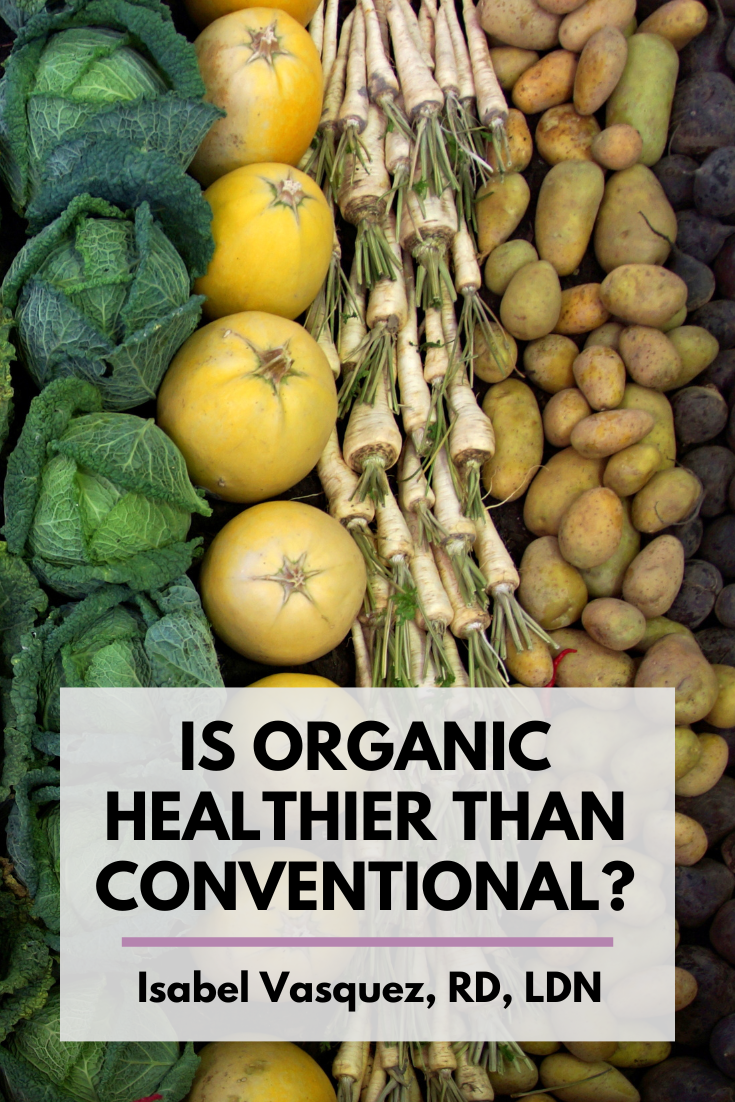Is Organic Food Healthier Than Conventional?
Written by Isabel Vasquez RD, LDN
Organic or conventional? This is a question many privileged shoppers face at the grocery store.
Organic has become a term that many equate with “healthier”. But is that really true?
In this blog, learn what organic even means, and whether organic food is better for your health so you can make empowered decisions in the grocery store that aren’t rooted in fear.
What does organic really mean?
Organic is a term regulated by the United States Department of Agriculture (USDA). The USDA says that organically grown foods can’t use synthetic fertilizers, sewage sludge, irradiation, and genetic engineering. So, organic foods are also non-GMO.
Contrary to what many consumers believe, pesticides are used in organic farming, per the USDA; however, they have to be made with natural ingredients and not synthetic ones.
The USDA grants certification to farms who pay for an inspection and are approved as following their organic certification guidelines. Foods with the certified organic seal are 95% or more organic.
Who can afford to eat organic?
We can’t talk about organic food without talking about the cost. Organic foods tend to be much more expensive than their conventional counterparts.
So, we have to consider who can even afford these foods and who has access to them before we talk about their health implications compared to conventional food.
Despite systemic factors like food swamps—areas with a high density of low-quality food sources, disproportionately affecting BIPOC and low socioeconomic status communities—playing a humongous role in what food people can purchase, judgment is typically placed on the individuals living in these neighborhoods rather than on the systemic issues that cause these injustices.
With organic food being glorified by wellness culture, further judgment gets placed on lower-income or systemically-oppressed individuals who can’t afford these foods, often by upper-class folks who claim organic is better.
That doesn’t mean that folks with a low socioeconomic status aren’t affected by organic marketing.
A 2016 study in Nutrition Today surveyed 500 low-income consumers, 15% of whom said that they planned to eat fewer fruits and vegetables after becoming aware of the Dirty Dozen list—a list of 12 produce items with the highest concentration of pesticide residue. (Whether or not that means you actually need to buy organic versions of these foods is up for debate.)
So not only is organic food inaccessible for low-income folks, but organic marketing could result in less fruit and vegetable consumption overall. That’s problematic because eating more fruits and veggies is linked with lower risk of cardiovascular disease, cancer, and mortality, per a 2017 study in the International Journal of Epidemiology.
Is organic healthier than conventional?
Overall, there is no conclusive evidence that organic food is healthier than conventional food.
A 2019 systematic review of 35 studies published in Nutrients found some correlations between higher organic food intake and better health outcomes, but the researchers are also quite clear that the existing studies are short-term and can’t determine that organic food consumption causes better health outcomes. A 2017 review in Annual Reviews of Public Health had similar findings.
In fact, the researchers even address the fact that people who eat more organic foods also tend to have healthier eating patterns in general, so it may not be the organic food itself but the overall nutritional benefits of their diet that play a bigger role.
Plus, people who can afford to eat more organic foods probably are also probably wealthier. They likely face less systemic challenges such as poverty, racism, and lack of access to quality healthcare. So, there’s a possibility these correlations are related to food access and systemic factors more than the merits of organic food itself.
Furthermore, the Nutrients review reports that there does seem to be less pesticide residue in the urine of people who eat more organic foods; however, there isn’t conclusive evidence that this impacts health.
Nutritionally, organic food has the same nutrient content in terms of fats, carbs, proteins, fiber, etc. There are slight differences in antioxidants and omega-3s, but they’re too minimal to make a difference on health, per a 2017 study in Environmental Health.
Final Thoughts
Eating a nutritious variety of foods is health-promoting, organic or not. If purchasing organic foods is in your budget and you prefer doing so, then go for it. But the research we have so far doesn’t reveal any clear benefits of organic food on human health.
For education on how to ADD nutrition to your favorite Latine cultural dishes, make peace with food, and focus on your health without dieting, join our nutrition library for only $27/month.
If you liked this post, you may also want to read:
Mexican Vegetables: A Complete Nutrition Guide

